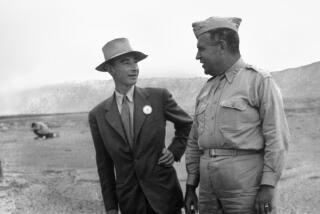Joseph Weber; Laser Pioneer Expanded on Theories of Einstein
Joseph Weber, a prominent UC Irvine professor who spent much of his career chasing after the mysteries of physics and deep space, died Sept. 30 in a Pittsburgh hospital from complications from the treatment of non-Hodgkin’s lymphoma. He was 81.
Weber is credited with discovering the basic principles of lasers, discussing the subject as early as 1952 and expanding upon theories first advanced by Albert Einstein.
He was married for 28 years to another well-known UC Irvine scientist, Virginia Trimble, an astronomer and author. Together they split the year between Irvine and Maryland, where he was a research scientist at the University of Maryland.
Recognized in academic and scientific circles for his pioneering work, Weber pursued--as others continue to do--a means of measuring gravitational waves that travel at the speed of light from the deep reaches of space, caused by collapsing stars and other huge shifts in mass.
The influence of Weber’s work was extensive and includes the $300-million Laser Interferometer Gravitational-Wave Observatory, or LIGO, which, when completed, will examine gravitational waves.
“He will forever be known as the father of gravitational radiation detectors, having worked on both the theory and early experiments in the field,” said Gary Chanan, chair of UC Irvine’s department of physics and astronomy. “Those are being pursued on an ever-grander scale and will continue to be for generations.”
Chanan said Weber was widely respected and that he was in extraordinary physical shape, often running and mountain climbing.
“I used to see him out on the track running laps at lunchtime when he was well into his 70s,” he said.
Born in Paterson, N.J., to Eastern European immigrants, Weber received a bachelor’s degree from the United States Naval Academy. He served on the aircraft carrier Lexington and survived its sinking by Japanese aircraft on May 8, 1942.
In 1948, he took a job as a professor at the University of Maryland. While teaching, he also studied for his doctorate in physics at the Catholic University of America. In 1952, he started his research into lasers.
He and Trimble, his second wife, married after only two months of courting in 1972 and had a strong relationship revolving around their love of science. They collaborated on some research papers on gravitational radiation data early in their marriage.
“We typically never squabbled very much,” said Trimble. “If we disagreed, it was about scientific issues. He didn’t believe the observational evidence for the cosmological constant, and I think it’s highly probable.”
Raised as an Orthodox Jew, Weber attended Temple Beth Emet in Anaheim with his wife, who said he was actually an atheist who wanted to maintain Jewish traditions.
“It was another thing we didn’t have to disagree about,” said Trimble. “We both agreed that modern cosmology provided a better picture of the early universe than does the book of Genesis.”
Besides his wife, Weber is survived by two sisters, Rae Beim and Anne Lazar; a brother, Jules Weber; three sons from his first marriage, Jonathan, Matthew and David; and six grandchildren. His first wife, Anita Straus, died in 1971.




